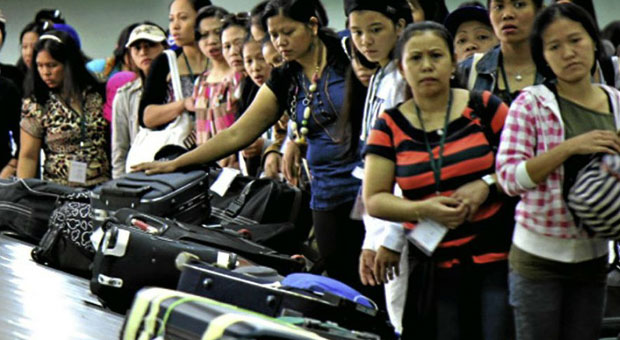The misery of being Filipino
TRAVEL BROADENS the mind; for the Filipino tourist or scholar or worker abroad, it must also deepen the misery of being Filipino. Do not get me wrong; Filipinos are a famously happy people, with an extraordinary capacity for both work and play. I can also attest, from my own happy experience, to the resurgence in patriotic pride since the late 1980s.
Whether it was the People Power revolution in 1986 which electrified the world, or the 1991 Southeast Asian Games we hosted and nearly won, or the decade and a half of uninterrupted economic growth since 2001; whether it is the worldwide fame of a boxing all-time great, or the phenomenal rise of a completely new industry in business process outsourcing, or the determined challenge against an expansionist superpower in the West Philippine Sea, or the continuing celebration of the 150th anniversary of the birth of a heroic generation—I share the sense that many Filipinos are proud of their country, with an uncomplicated sense of pride. It is a pride different in degree from the identity-anxious nationalism of the 1960s, different in kind from the sham Filipinism promoted by a dictatorial regime in the 1970s.
At least that is my sense: There is today a greater clarity about our place in the sun.
But a Filipino in Bangkok, where the city traffic once compared unfavorably to that of Metro Manila, cannot but feel a sharp frustration when riding the Thai light rail system. It is less polished than that of Hong Kong, but it’s airy, well-maintained, easy to use. It is expectedly packed at rush hour, but the air-conditioning system works like a dream. In contrast, the light rail system in Metro Manila is a daily insult, a concatenation of deliberate or accidental aggravations.
A Filipino in Kuala Lumpur can take an express train from the city center directly to the gleaming airport, arriving in exactly 28 minutes. There is free and uninterrupted wifi on board, and the seats on the train are immaculate and well-appointed. Even in Jakarta, a sprawling mess, a Filipino can marvel at the open spaces and the massive malls. And let’s not even get started on Singapore.
I do not mean to suggest that gleaming infrastructure is the only true measure of national pride, not at all. But the frustration the Filipino tourist or scholar or worker feels, on seeing amenities and facilities that we enjoy abroad but not necessarily at home, is the unhappiness of a citizen seeing her country being left behind.
That is what I mean by misery: We return to the Philippines and think, “Back to the real world,” as though Bangkok and Kuala Lumpur or Jakarta (or, even more, Singapore) were fantasy worlds rather than mere neighboring capitals.
But the misery of being Filipino—I am borrowing from Nikos Dimou’s famous title, “On the Unhappiness of Being Greek”—is rooted in a deep sense of possibility, in a genuine love of country. We know we deserve better, which is why we feel our frustrations sharply, like a stab in the back.
* * *
A postscript Nikos Dimou wrote in 2012 (and which I read on his personal website) explains his controversial title. Accounting for necessary changes in circumstance, I think it can apply to those of us—and we must be many, judging from letters to the editor and posts on Facebook and pictures on Instagram—who feel the comparative misery of being Filipino when abroad:
“It portrays the basic problem of his existence, his urge for more and his inability to cope with less. Conflicts undermine his identity, make him uncertain and changeable. He is divided between his glorious past and his meager present, between his Eastern mentality and his European aspiration—torn asunder by forces of tradition (like the Orthodox Church) and modernity. His is a difficult fate.
“This book is not a humorous collection of aphorisms about the shortcomings of Greeks—but a bitter reflection on their tragic destiny of being split among past and present, north and south, east and west. It is a declaration of love for Greece, the true, the profound Greece—and not the superficial land of myths that Greek themselves have created in order to escape from reality. By no means is it the work of an ‘Anti-Hellene’ but the product of a man who cares deeply for his country, and tries to help his fellow citizens fulfill the Delphic motto: ‘Know thyself.’ Something that can be a painful procedure, if your mentality, education and upbringing have taught you to avoid truth.
“Greece’s present predicament is to a large extent the result of all these flaws. More emotional and less rational, a Greek must re-think himself in order to survive in the modern world.”
* * *
“A stab in the back.” That sounds like a justification for a strategy of blaming the other: the politicians, the entire political class, the corporations, the Americans, the Church, the Muslims, the Chinese, the celebrities and their inane variety shows, television and its formulaic soap operas, journalists and their complicity with power.
But surely part of the reason we endure the daily provocations is because we put up with them. We are too kind, too forgiving—happy to forget, to gloss over, to laugh at, to make excuses for, our misery.
* * *
On Twitter: @jnery_newsstand





















